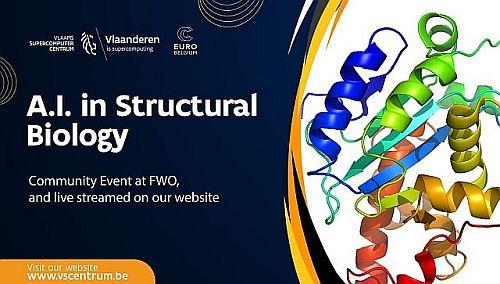Webinar A.I. in Structural Biology 19/01/2024

Join our webinar on January 19th 2024, to delve into the transformative role of AI in structural biology, spearheaded by AlphaFold2. Discover how this cutting-edge technology is reshaping our approach to protein structures, enhancing knowledge of protein-protein interactions, and leading the way in de novo protein design.
We are thrilled to welcome the following speakers for an enlightening session filled with groundbreaking insights at the forefront of AI applications in structural biology:
Prof. Arne Elofsson (Stockholm University) - Towards a Complete Structural Map of the Human Proteome Using AlphaFold
"How far are we from a complete understanding of protein-protein interactions in a human cell?
Cellular functions are governed by molecular machines that assemble through protein-protein interactions. Their atomic details are critical to studying their molecular mechanisms. Today the structure of virtually all individual proteins is available from predictions using AlphaFold. However, these predictions are limited to individual chains and do not include interactions. In this talk I will describe our attempts to increase the structural coverage of protein-protein interactions. Today fewer than 5% of hundreds of thousands of human protein interactions have been structurally characterised. We show that combining predictions and experiments can orthogonally confirm higher-confidence models, and using AlphaFold2, we have built 3,137 high-confidence models, of which 1,371 have no homology to a known structure. We are exploring rapid methods to identify protein interaction networks. Finally, we show how the predicted binary complexes can be used to build very larger assemblies using a Monte Carlo Tree search method.
Casper Goverde (EPFL) - Functional design of soluble analogs of integral membrane proteins
"Deep learning-based tools can be used to push the frontier of complex proteins forwards. Inspired by natural membrane proteins, we show how complex structural and functional features of membrane proteins can be recapitulated in soluble analogs."
Breakthroughs in the field of computational protein design allows for the design of ever larger and more complex protein folds. However, there is a significant gap that needs to be bridged to reach the complexity and functionality of natural protein folds. The aim of this talk is to show how deep learning-based tools can be used to push the frontier of complex proteins forwards. Inspired by natural membrane proteins such as G-Protein Coupled Receptors and claudins, we show how complex structural and functional features of membrane proteins can be recapitulated in soluble analogs. The expansion of the soluble fold space opens the door to new applications in biotechnology such as novel protein sensors and potentially new drug discovery approaches.
Dr. Maxim Tsenkov (EMBL-EBI) - Harmonising Structure and Function: An Illumination of the Protein Landscape
"Join me as we equip you, the scientific community, with the necessary tools and methods to utilise this wealth of data, driving forward discovery and innovation at the crossroads of AI and biology."
Artificial intelligence has revolutionised structural biology, extending its reach to a broader scientific audience. At AlphaFold Protein Structure Database, we make these predicted structure models widely accessible, supporting diverse research with tools like Foldseek. This integration allows for deep exploration of the protein universe, enhancing understanding of structure and function. Join me as we equip you, the scientific community, with the necessary tools and methods to utilise this wealth of data, driving forward discovery and innovation at the crossroads of AI and biology.
More information and registration via www.vscentrum.be/events/alphafold-event-3